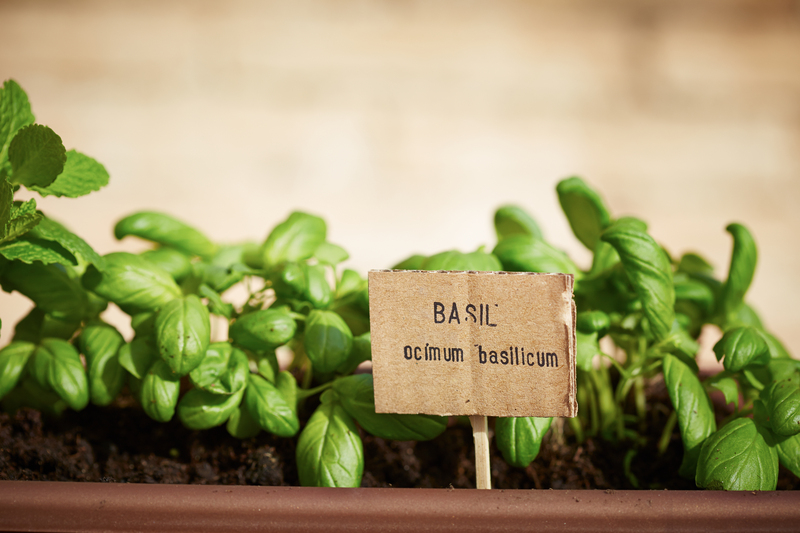9 Key Gardening Tips to Help Beginners Grow with Confidence
Posted on 03/10/2025
9 Key Gardening Tips to Help Beginners Grow with Confidence
Starting your first garden can feel both exciting and a bit overwhelming. The sight of thriving plants, vibrant flowers, and delicious home-grown vegetables is rewarding, but every gardener -- even seasoned experts -- starts as a beginner. If you're looking to nurture your green thumb and grow with confidence, you're in the right place! This comprehensive guide provides 9 key gardening tips for beginners to help you establish a flourishing garden, avoid rookie mistakes, and enjoy the process every step of the way.
Why Gardening is a Wonderful Hobby for Beginners
Gardening offers more than just beauty for your home -- it's a calming activity that connects you with nature, boosts physical activity, and can even save money on groceries! Embarking on a gardening journey can teach patience, responsibility, and environmental awareness, all while providing fresh air and relaxation. To make sure your first gardening experience is enjoyable and fruitful, keep these beginner gardening tips in mind.

1. Start Small and Choose the Right Location
Don't bite off more than you can chew. A common mistake beginning gardeners make is starting too big. It's best to focus on a small section or a container garden, especially if you're learning the basics. This approach allows you to experiment, observe, and make adjustments without getting overwhelmed.
- Begin with a few pots -- windowsill herb gardens, small raised beds, or patio containers are perfect for starters.
- Select a location with ample sunlight, ideally 6-8 hours per day, as most vegetables and flowers thrive with plenty of natural light.
- Ensure the spot has easy access to water and is protected from harsh winds.
Remember: Healthy plants start with the right space. Observe your yard or balcony during the day to see where sunlight hits and pick the most promising place.
2. Understand Your Soil and Improve It
Soil quality is the foundation of successful gardening. Plants draw their nutrients from the ground, so understanding your soil is crucial. Healthy, well-draining soil sets the stage for plants to flourish.
- Test your soil: Home testing kits can indicate your soil's pH and nutrient content.
- Add organic matter: Mix in compost, leaf mold, or well-rotted manure to enrich the soil with essential nutrients.
- If your soil is poor or heavy clay, raised beds or container gardening may be a smart choice for beginners.
- Mulch your soil: A layer of mulch retains moisture, prevents weeds, and improves soil structure over time.
*Tip*: Regularly amending your soil leads to stronger roots and healthier plants, setting the stage for gardening success.
3. Pick the Right Plants for Beginners
With thousands of plant types available, it's tempting to try the most exotic ones. However, select native or beginner-friendly plants that suit your region and conditions. These plants tend to be less fussy, more resilient, and more rewarding for novice gardeners.
- Easy vegetables: Lettuce, radishes, green beans, peas, and zucchini.
- Beginner flowers: Marigolds, sunflowers, petunias, pansies, and cosmos.
- Herbs: Basil, mint, chives, and parsley do well in small containers or garden beds.
- Visit a local nursery for advice about region-specific options and seasonal planting times.
*Remember*: Caring for manageable, sturdy plants helps you build experience and confidence.
4. Learn How and When to Water
Proper watering is crucial for plant health. Overwatering is a common beginner's error, and so is neglecting to water during dry spells. Different plants have different needs, but some general watering tips keep your garden hydrated without drowning it.
- Water in the early morning or late afternoon to avoid evaporation in the midday sun.
- Check soil moisture by poking a finger into the soil; water when the top inch feels dry.
- Use mulch to help retain moisture and prevent weeds.
- Invest in a watering can or gentle spray nozzle to avoid displacing soil or damaging seedlings.
Consistent watering habits promote strong growth and healthy root systems. Don't forget to adjust your watering schedule for rainfall, seasonal changes, and heat spells!
5. Feed Your Plants with the Right Nutrients
While soil provides some nutrients, many plants need a little extra boost to thrive. Understanding basic plant nutrition is one of the most important gardening tips for beginners:
- Use a balanced fertilizer according to plant needs; read package instructions carefully.
- Organic options like compost tea or fish emulsion are gentle and effective, especially for vegetables.
- Don't over-fertilize -- it can harm plants and pollute waterways. Less is often more!
- Observe plants for yellowing leaves or poor growth, which may indicate a lack of nutrients.
*Tip*: Treat your plants to regular, light feedings rather than a heavy dose all at once.
6. Keep Pests and Diseases at Bay
Every gardener faces pests and plant diseases at some point. Early identification and sustainable prevention are key for beginners to maintain a healthy garden.
- Encourage natural predators like ladybugs and birds to visit your garden; they eat aphids and other pests.
- Inspect your plants regularly for holes, sticky residue, or discolored leaves.
- Remove damaged leaves and plants immediately to prevent the spread of problems.
- Try natural remedies (like neem oil or insecticidal soap) before turning to harsh chemicals.
A vigilant attitude and a little patience can keep your plants thriving, without harming beneficial insects or your environment.
7. Practice Proper Plant Spacing and Pruning
It's tempting to plant seeds or seedlings close together to maximize your space, but overcrowding leads to poor air circulation, disease, and weak growth. Adhering to recommended spacing gives your plants room to breathe and prosper.
- Read seed packets or plant labels carefully for spacing guidelines.
- Prune dead or overcrowded branches/leaves for healthier growth and better airflow.
- Use clean, sharp pruning tools to avoid transmitting disease between plants.
*Bonus tip*: Removing "suckers" (small shoots) from tomato plants boosts fruit production and plant health.
8. Stay Consistent with Garden Maintenance
A little daily attention ensures your garden continues to flourish. Successful gardening for beginners involves regular tasks that prevent big issues from cropping up later.
- Weed frequently -- weeds compete with plants for sunlight, water, and nutrients.
- Check for pests and diseases often so you can take quick action if needed.
- Harvest ripe fruits or vegetables promptly to encourage ongoing produce.
- Keep your gardening tools clean to avoid spreading pests and pathogens.
*Tip*: A daily walk through your garden not only relaxes you, it keeps you tuned-in to your plants' needs!
9. Document and Celebrate Your Progress
Don't forget to record your gardening journey! Keeping simple notes or a photo diary of your garden's progress helps you learn from mistakes, plan for the future, and appreciate how much you've accomplished.
- Record planting dates, weather conditions, and yields in a notebook or app.
- Take "before and after" photos to see your progress over time.
- Celebrate your successes and enjoy the fruits (and flowers) of your labor.
- Share your experiences and harvest with friends or community gardeners -- gardening is more fun together!
Every gardener makes mistakes, but documenting them helps you grow wiser and more confident each season.
Bonus Tip: Never Stop Learning
Gardening is a journey, and every season brings something new to discover. Explore online gardening communities, attend local workshops, or read books for inspiration and education. Stay curious and don't be afraid to ask questions -- even master gardeners are always learning!

Frequently Asked Questions for Beginner Gardeners
What is the easiest vegetable to grow for beginners?
Many beginners find radishes, lettuce, and green beans among the simplest vegetables to grow. They germinate quickly, are tolerant of a variety of conditions, and don't require extensive maintenance. Start with these veggies in your garden for fast, satisfying results.
How often should I water my garden as a beginner?
Beginners should aim to water thoroughly when the top inch of soil feels dry -- typically 2-3 times a week, but this can change based on weather, soil type, and plant selection. Clay soil retains water longer, while sandy soil dries out faster. Always check soil moisture before watering.
What tools do beginner gardeners need?
Start with basic equipment: gloves, a trowel, a watering can (or hose), pruning shears, and a spade or shovel. As you gain experience, you can invest in more specialized tools, but these will cover most tasks in a new garden.
Conclusion: Let Your Garden and Confidence Grow
Gardening offers endless joys and learning opportunities, no matter your skill level. By following these 9 essential gardening tips for beginners, you'll be well on your way to creating a lush, productive, and beautiful outdoor (or indoor) space. Start small, pay attention to your environment, and remember: each mistake is merely a stepping stone toward becoming a successful gardener.
Ready to dig in? With patience, observation, and these expert suggestions, your gardening journey is sure to be rewarding. Happy growing!
- Start small to avoid overwhelm
- Test and amend your soil
- Choose beginner-friendly plants
- Water wisely
- Feed your plants
- Control pests naturally
- Give your plants space and prune as needed
- Stay consistent with maintenance
- Document your progress and celebrate every achievement
For more expert gardening guidance and updates, bookmark this page or join a local gardening club. Watch your passion -- and your plants -- blossom!

